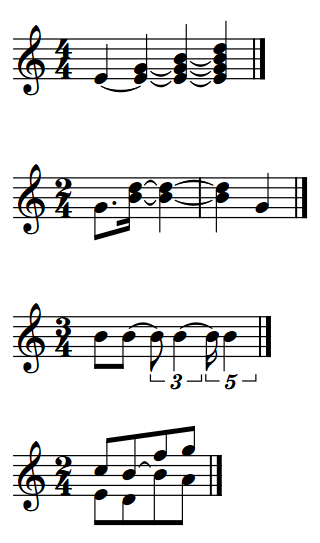- From: Joe Berkovitz <joe@noteflight.com>
- Date: Tue, 21 Mar 2017 15:03:59 -0400
- To: public-music-notation-contrib@w3.org, notenlektorat <post@notenlektorat.de>
- Message-ID: <CA+ojG-Zd4Va6KJFRZLJHtM5KOCTE3p-hLZ35o9wDNnKXn=MEEQ@mail.gmail.com>
Hi,
This question comes from Alex Plötz. He had some trouble accessing the list
so I'm forwarding his question at his request (and answering it).
Alex: here are my encodings of the 4 examples you attached. I am just going
to represent these
as measures, not full documents.
Unavoidably, I'm going to have to get out in front of the published draft
proposal in some areas, but that's probably a good thing. It just
represents my current point of view on how certain things might work, like
ties between different voices (sequences).
1. tied-over chords
<measure>
<sequence>
<event value="4">
<note pitch="E4">
<tie/> <!-- implicitly connects to same pitch in following
event -->
</note>
</event>
<event value="4">
<note pitch="E4">
<tie/>
</note>
<note pitch="G4">
<tie/>
</note>
</event>
<event value="4">
<note pitch="E4">
<tie/>
</note>
<note pitch="G4">
<tie/>
</note>
<note pitch="B5">
<tie/>
</note>
</event>
<event value="4">
<note pitch="E4">
<tie/>
</note>
<note pitch="G4">
<tie/>
</note>
<note pitch="B5">
<tie/>
</note>
<note pitch="D5">
</note>
</event>
</sequence>
</measure>
2. ties across measure
<measure>
<sequence>
<event value="8*">
<note pitch="G4"/>
</event>
<event value="16">
<note pitch="B5">
<tie/>
</note>
<note pitch="D5">
<tie/>
</note>
</event>
<event value="4">
<note pitch="B5">
<tie/>
</note>
<note pitch="D5">
<tie/>
</note>
</event>
</sequence>
</measure>
<measure>
<sequence>
<event value="4">
<note pitch="B5"/>
<note pitch="D5"/>
</event>
<event value="4">
<note pitch="G4"/>
</event>
</sequence>
</measure>
3. ties across tuplets
<measure>
<sequence>
<event value="8">
<note pitch="B5"/>
</event>
<event value="8">
<note pitch="B5"><tie/></note>
</event>
<tuplet actual="3/8" normal="1/4">
<event value="8">
<note pitch="B5"></note>
</event>
<event value="4">
<note pitch="B5"/><tie/></event>
</event>
</tuplet>
<tuplet actual="5/16" normal="1/4">
<event value="16">
<note pitch="B5"/>
</event>
<event value="4">
<note pitch="B5"/>
</event>
</tuplet>
</sequence>
</measure>
4. ties across voices (this is the most interesting and speculative one).
I think this may be incorrectly beamed from an engraving point of view,
since the tie suggests that the C5/B5/A5 sequence is a single descending
voice, but the stemming and beaming contradicts this. Anyway, it should
presumably be allowed even if it's not good engraving. So:
<measure>
<sequence orientation="up">
<event value="8">
<note pitch="C5"/>
</event>
<event value="8">
<note pitch="B5">
<tie stop-ref="note1"/> <!-- analogous to explicit slur
endpoint -->
</note>
</event>
<event value="8">
<note pitch="F5"/>
</event>
<event value="8">
<note pitch="G5"/>
</event>
</sequence>
<sequence orientation="down">
<event value="8">
<note pitch="E4"/>
</event>
<event value="8">
<note pitch="D4"/>
</event>
<event value="8">
<note id="note1" pitch="B5"/> <!-- target of preceding tie -->
</event>
<event value="8">
<note pitch="A5"/>
</event>
</sequence>
</measure>
I think this would be better engraved, though, as:
<measure>
<sequence orientation="up">
<event value="8">
<note pitch="C5"/>
</event>
<event value="4">
<note pitch="B5"/>
</event>
<event value="8">
<note pitch="A5"/>
</event>
</sequence>
<sequence orientation="down">
<event value="8">
<note pitch="E4"/>
</event>
<event value="8">
<note pitch="D4"/>
</event>
<event value="8">
<note pitch="F5"/>
</event>
<event value="8">
<note pitch="G5"/>
</event>
</sequence>
</measure>
*From:* notenlektorat [mailto:post@notenlektorat.de]
*Sent:* Dienstag, 21. März 2017 17:48
*To:* Music Notation Community Group
*Subject:* RE: MNX Proposal now Available [via Music Notation Community
Group]
Hi Joe,
this certainly is a lot to digest, and I am equal parts excited and freaked
out about the prospect of discussing this overview and moving it forward
over the next months. Personally, I will probably need some days to
ruminate before I feel confident to comment in depth.
Since there are some aspects that are more unclear to me than others, and
since I would like to avoid sending myself on a wild-goose chase when
thinking about those – could you please do me the favour of sketching out
how under your proposal the four short examples in the attached screenshot
might be encoded?
Attachments
- image/png attachment: MNX_requests.png

Received on Tuesday, 21 March 2017 19:04:33 UTC